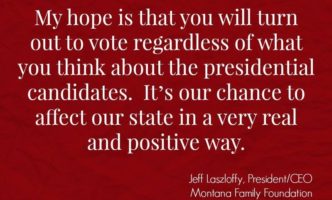News & Updates
Vote Your Values
Last week on this broadcast, we talked about who to vote for. In the cacophony of T.V. ads, radio ads, glossy mailers and billboards, how do we choose the right candidate for us? Where do we go for relevant information on the issues that WE care about? I suggested our website at montanafamily.org for information on candidates’ positions, current issues and party platforms. This week I would like to move upstream and talk about the importance of voting, the CRITICAL importance of voting.
All across the state, I hear people, filled with anxiety and despair, complaining about their choices for President. Okay, I get that, but what I don’t understand are the people who say they will sit out this election cycle because they don’t like their choices for President. It makes no sense. The race for President is only one race on a long ballot. Who will be our Congressman or Governor? Who will administer government-mandated healthcare in the state? That’s the job of the State Auditor. What about Public Service Commissioners whose job it is to set utility rates? Or the Superintendent of Public Instruction who will play a key role in stopping or promoting President Obama’s policy of allowing boys to use girls’ locker rooms? Below that, we have races for State House and Senate, and four ballot issues, including expanding the use of medical marijuana. What I’m trying to say is that not voting because of who is running for President is short-sighted. There are lots of other races that will impact your life far more personally than who gets elected as President. In 2012, millions of disillusioned Christians decided not to vote. It gave President Obama his second term and affected other races up and down the ballot. We cannot afford to let that happen again.
With that in mind, the Montana Family Foundation is partnering with Focus on the Family in urging you to commit to vote. This week we mailed hundreds of voter registration packets to churches across the state, urging them to hold a voter registration Sunday on October 9th. The packet contains voter registration forms and a flash drive with short fun videos explaining why your vote is critical. The same packet is available on our website at montanafamily.org and we are asking all of our listeners to go to their pastors and ask them to show one of the videos and then urge the congregation to vote their values on election day. Ecclesiastes 3 says, “There is a time to remain silent and a time to speak.” NOW is the time to speak. The church in Montana has been silent for far too long, and our state is suffering as a result.
This week the Montana Family Foundation also partnered with the Family Research Council and Concerned Women for America on their Values Voters Bus Tour. The bus is making a swing through 20 states urging Christians to register and then vote their values. Time is short. Absentee voting begins on October 14th, and the close of regular voter registration is October 11th. That’s why we’re asking YOU to head up a voter registration Sunday in YOUR church on October 9th. The materials are on our website. If not us, then who, and if not now, then when?
For the Montana Family Foundation, this is Jeff Laszloffy reminding you that this government is your government and your input DOES make a difference!
Who Do I Vote For?
Ready or not, here they come! It’s election season and absentee ballots are being readied by county election officials across the state. Now the question is; who to vote for? Where can you get reliable information on the candidates? It seems every other ad on television is a campaign ad, is that a reliable source? What about those glossy flyers that fill up your mailbox? Or the internet ads that keep popping up on your screen? Better yet, what about talking to the candidates themselves? Or looking to see which of our neighbors have whose campaign signs in their yards. Are any of these a clear indication of who to vote for? In my humble opinion the answer is both yes and no. Because each of these contains some truth, but not the total truth.
Candidates tell you what they want you to hear but it’s not their job to tell you their own faults. That job falls to their opponent. Some people call this negative campaigning, but it’s really an important part of the process. It sets up a mechanism to make sure that candidates are fully vetted. The candidate tells you the very best, the opponent tells you the very worst, and the truth is probably somewhere in the middle. It’s up to us to discern the truth. Thomas Jefferson once said that, “The purpose of an education is to create a citizenry intelligent enough to maintain its freedom.” It’s really up to us to dig up the truth and some voters are more diligent than others.
What’s frustrating is voters who put in no effort at all, and who vote on the last soundbite they heard on a 30 second T.V. commercial. We call them low information voters and campaigns spend a lot of time chasing their votes. The problem is, their vote counts just as much as the person who spends weeks trying to figure out who to vote for. The thought that my vote could be canceled out by someone who spends his evenings sitting in his lazy boy, sucking on grape sodas and watching re-runs of Ripley’s Believe-It-Or-Not, is almost more than I can bear. There is however, another way to cast an informed vote and that’s by using endorsements by groups that you trust.
For teachers, it might be the Teacher’s Union. For sportsmen, it might be the NRA, or the Montana Shooting Sports Association. And for those interested in Judeo Christian Family Values, might I suggest The Montana Family Foundation. Ours is a hard endorsement to get. Current officeholders running for re-election must have a 100% pro-family voting record in their most recent term in office. Those who have never held office must have a 100% pro-family score on our voter guide questionnaire. For candidates like those running for supreme court who have never held office, we researched public statements and judicial decisions to determine who to recommend to our members. As citizens, we have not only a right to vote, but the responsibility to cast an informed vote.

The Millennial Question
As is often the case, who wins and who loses in the upcoming November election is, to a large degree, a function of voter turnout. This was critical in the 2012 election cycle where evangelical Christians stayed home in droves and Mitt Romney lost, giving President Obama his second term.
This year will be no different, but there are some interesting nuances. With the latest polls showing an extremely tight race between Donald Trump and Hillary Clinton, turnout is critical and both candidates have their challenges. Trump, like Romney, has yet to seal the deal with rank and file evangelicals, although he does appear to have the support of the Who’s Who of evangelical hierarchy nationwide. Clinton, on the other hand, has yet to lock up the millennial vote that largely supported Bernie Sanders in the primary. The conventional wisdom was that they would migrate to Clinton after Sanders’s defeat, but that didn’t happen. Whether it’s a lingering bitterness over the way Sanders was treated by Clinton and the Democratic party or Clinton’s numerous conflicts of interest or her health issues, millennials remain skeptical. In a recent Quinnipiac poll, millennials, in large numbers, are leaning toward third party candidates Gary Johnson and Jill Stein. According to the poll, in a head-to-head match-up, Clinton leads Trump 48% to 43%, and she’s particularly strong with millennials where she leads Trump 55% to 34%. Her problems begin when Libertarian candidate Gary Johnson and Green Party candidate Jill Stein are added to the mix. In a four-way race, Clinton’s lead over Trump falls to 2%, 41% to 39% with Johnson at 13% and Stein at 4%. And when we zero in on the millennials, the numbers are even more dramatic. Clinton falls to 31%, Johnson rises to 29%, Trump is in third with 26%, and Stein takes 15%. The latest CBS/New York Times poll shows similar numbers, and this begs the question: Will millennials stick with their preferred third party candidates on election day, even if it means Trump may win, or will they stay home and sit this one out altogether?
Another question is: How does this affect us here in Montana? And the answer is: More than you think. Presidential elections tend to have more energy and, thus, a larger turnout, but that can be a double-edged sword. If a party’s candidate is popular, it can bring people to the polls who generally vote sporadically. If the candidate is unpopular, then large portions of the base may stay home. This, in turn, has a huge positive or negative impact on the down ticket races, such as the race for Governor, Attorney General, Supreme Court and the State House and Senate. And the sad thing is that the farther down the ticket you go, the more real impact those elected officials have on people’s everyday lives. I would argue that local school board members and city and county commissioners have a much bigger impact on our lives in terms of tangible everyday decisions, than the President of the United States will ever have.
My hope is that you will turn out to vote, regardless of what you think of the Presidential candidates. It’s our chance to affect our state in a very real and positive way.
For the Montana Family Foundation, this is Jeff Laszloffy reminding you that this government is your government and your input DOES make a difference!
Montana Family Foundation Endorses Candidates
The Montana Family Foundation endorses the following candidates for election to statewide office based on their record in their most recent term in office or based on public statements.
For U.S. Congress
Ryan Zinke
For Governor:
Greg Gianforte
For Secretary of State:
Corey Stapleton
For Attorney General:
Tim Fox
For Superintendent of Public Instruction:
Elsie Arntzen
For State Auditor:
Matt Rosendale
For Supreme Court Justice #3:
Kristen Juras
For Legislature:
The criteria for endorsement for Legislative candidates were: 1) a 100% record on MFF-scored pro-family issues in the candidate’s most recent term in office or, for candidates who have not served in public office, 100% favorable answers on all questions asked of the candidate by MFF on family policy.
Nancy Ballance (HD 87)
Seth Berglee (HD 58)
Chet Billi (HD 5)
Randy Brodehl (HD 09)
Bob Brown (HD 13)
Tom Burnett (HD 67)
Michael Cooper Sr. (HD 26)
Mike Cuff (HD 02)
Alan Doane (HD 36)
Mark Dunn (HD 23)
Ron Ehli (HD 86)
Jeff Essmann (HD 54)
Jennifer Fielder (SD 07)
Steve Fitzpatrick (SD 10)
Kelly Flynn (HD 70)
Wylie Galt (HD 30)
Neal Ganser (HD 61)
Terry Gauthier (SD 40)
Carl Glimm (HD 06)
Ed Greef (HD 88)
Greg Hertz (HD 12)
Stephanie Hess (HD 28)
Steve Hinebauch (SD 18)
Kenneth Holmlund (HD 38)
Donna Huston (SD 25)
Donald Jones (HD 46)
Austin Knudsen (HD 34)
Debra Lamm (HD 60)
Mike Lang (SD 17)
Steve Lavin (HD 08)
Dennis Lenz (HD 53)
Forrest Mandeville (HD 57)
Theresa Manzella (HD 85)
Wendy McKamey (HD 19)
Bruce Meyers (SD 16)
Dale Mortensen (HD 44)
Mark Noland (HD 10)
Albert Olszewski (SD 06)
Ryan Osmundson (SD 15)
Alan Redfield (HD 59)
Keith Regier (SD 03)
Matt Regier (HD 04)
Vince Ricci (HD 55)
Don Roberts (SD 26)
Taylor Rose (HD 03)
Scott Sales (SD 35)
Robert Saunders (HD 48)
Kerri Seekins-Crowe (HD 50)
Lola Sheldon-Galloway (HD 22)
Derek Skees (HD 11)
Scott Staffanson (HD 35)
Fred Thomas (SD 44)
Brad Tschida (HD 97)
Barry Usher (HD 40)
Kirk Wagoner (HD 75)
Peggy Webb (HD 43)
Roger Webb (SD 23)
Kerry White (HD 64)

The AMA’s Dangerous Slide
Group Poised To Move on Key Life Issue
At its recent national meeting, the American Medical Association (AMA) took steps to move away from its long-standing opposition to doctor-assisted suicide.
It directed its Council on Ethical and Judicial Affairs to study the so-called “aid-in-dying” as an end-of-life option and to develop a recommendation toward the AMA taking a neutral position on doctor-prescribed death. The decision means physicians are one step closer to losing the right to fight for our patients and their families at times when they need us most.
 Traditionally, the AMA and its state medical societies have taken the position that every life is worth fighting for. Meanwhile, a “neutral” position taken by some state medical societies actually opened the door to giving doctors legal cover to prescribe deadly drugs for patients in that state.
Traditionally, the AMA and its state medical societies have taken the position that every life is worth fighting for. Meanwhile, a “neutral” position taken by some state medical societies actually opened the door to giving doctors legal cover to prescribe deadly drugs for patients in that state.
Dangerous Territory
The AMA’s recent flirtation with state-sanctioned suicide takes it, and all of us, into dangerous territory as doctor-prescribed death:
- Endangers the doctor-patient relationship by introducing suicide as a legal treatment option;
- In a climate of profit-driven health care, allows cost savings concerns of the patient or doctor to be a legitimate reason for suicide;
- Doctors get it wrong; this position fails to protect patients from misdiagnoses or inaccurate prognoses, or depression-induced requests to die;
- Puts vulnerable patients at risk for being pressured or coerced into suicide by weary caregivers or greedy heirs; and
- Provides little oversight of the process and control over medications in states where it’s legal.
Your Voice is Needed― Take Action Today
It’s critical this long-standing protection from the medical profession continues.
That’s why we’re asking you to contact both the national AMA, as well as your state medical society, urging each to oppose legalization of doctor-assisted suicide.
Please let your concerns be known by contacting these groups.
And, please forward this message so your friends and family, too, can take action.
- CALL: Call the national AMA office: (800) 262-3211. You can also reach out to the AMA via its webpage http://www.ama-assn.org/ama/pub/membership/contact-us.page
- CALL: Your State Medical Board: http://www.ama-assn.org/ama/pub/education-careers/becoming-physician/medical-licensure/state-medical-boards.page
- EMAIL: Email your concerns to the AMA’s Council on Ethical and Judicial Affairs at ceja@ama-assn.org.
Let’s focus on empowering people to live every moment.

